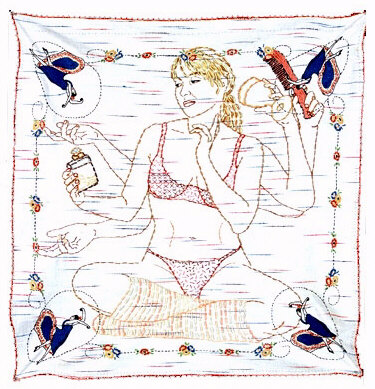 December 06
December 06
Religion and Insanity
by Jay Michaelson
p. 2 of 2
First, that Mother Eagle is an archetype may be what my educated, sensitive friend believes, but not what most believers really believe. The difference was fine for Maimonides, who was content to let the masses have their interpretation, and the philosophers have theirs (while, to be fair, advocating education for all, so that all could become philosophers). But does it really make sense to share a common vocabulary for such different phenomena as beings floating in the ether, and archetypes in the mind? And do I really want to quiz my friend on where he is on a Wilberian spectrum of theological sophistication? Isn't that a bit arrogant -- or at least alienating? Am I supposed to I keep checking up on him, to make sure that he doesn't really believe what he's saying?

To do so could be quite destructive, as well as rude. Functionally speaking, it's possible that myth only works when you do believe in it, when you make a commitment to it and say: well, it's possible that the world operates according to wholly scientific-material principles, and it's possible that it operates according to mysterious spiritual ones -- and I commit to the latter. And not spiritual in the way I usually refer to it -- not in the sense of "waking up to the miraculous truth of ordinary experience." But spiritual in the juicy, mythic way -- with Mother Eagle and the rest as actual energies both "out there" and "in here." You have to really believe this stuff -- even if, from my still-stuck-in-skepticism perspective, you seem totally nuts. That's when myth really gets going, and how evangelism gets out the vote.
Third, and most problematically, is that the "insanity" of religious experience -- a term I am using, loosely, to refer to delusion, confusion, and loss of touch with reality -- has less to do with dogma than to the weight given to subjective, generally non-rational, experience, and the disconnect from reality that that seems to indicate.
This is the point of Harris's observation (in Letter to a Christian Nation) that "if someone told us that God spoke to them through a toaster, we would conclude that this person is insane. I fail to see how the presence or absence of the toaster makes a difference." That is, even without ludicrous notions of a physical heaven where the saved eat cupcakes while the damned burn in hell, there is something about the religious experience itself that seems to bespeak a break from reality.
Which, given what most mystics say about the truthfulness of our concepts of reality, may be exactly what they want.
3. Are You Experienced?
What Western Buddhism, the New Age, evangelical Christianity, and Jewish Renewal all have in common is that, unlike traditional Western religion, they are tied to subjective experiences. Whether interpreted in terms of myth or not, whether mysticism is a mindstate or an encounter with God, these forms of religion are experiential in nature. The "sense of unity," the holy spirit, conversations with angels -- these phenomena differ in theology, but all weight the impulses of imagination and intuition over the hard data of the rational and perceptual faculties.
We may not like to acknowledge this similarity, but once one strips out the content of the myth, the experiential reality of the evangelical and the experiential reality of the Buddhist have more alike than not. Yes, one ascribes the experience to Christ, and the other purely to the mind -- but both give weight experience over apparent, conventional understandings of how the world works. For example, when I am on retreat, and observing how all the habits of the mind are thoroughly impersonal, I know, with a certainty, that the idea of a separate self is an illusion, and that this consciousness does not belong to "me" in any meaningful way. It occurs here, in this brain, but its contents are wholly borrowed from stuff outside. The sense of certainty -- that's the kicker, because it's that sense that we're told to trust.
And more than that, if I admit it: I feel a closeness to some kind of larger consciousness; an access to an internal wisdom that feels as though it, too, comes from "beyond;" and above all an ease, and an overpowering love. It scares me, in my rational, normal state, how in love with God I can become. Because that love, that "sense of closeness," all of it, no matter how I try to cleanse it of myth, is still a subjective experience that seems difficult to distinguish from madness.
So then, with whom do I have more in common -- the Evangelicals who trust their inspiration, or the literate atheists with whom I like to go to dinner? Really, I and people like me are split down the middle: I am aligned with the atheists on matters of science and cosmology, but aligned with the religionists on questions of spirit and subjectivity.
Maybe that's why I feel myself increasingly distanced from my angel-channeling friend -- because he's not split down the middle, but has instead gone over to the other side. Or rather, to a side, as opposed to my have-my-cake-and-eat-it-too perch, astride the fence of doubt. With my meditation practice, I can feel grounded anywhere -- but perhaps that sense of groundedness prolongs my indecision. Whereas, if I trust my experience, then I, too, must admit that I am on the side of the Tarot cards, the evangelicals, and the New Agers -- without all their myth, but necessarily open to the possibility that the myth contains deep and useful symbolism for the unconscious mind.
And why, exactly, do I not believe the myth? Because it is more accurate to interpret my devekut as a mindstate, and condescendingly look down on the 90% of the people in the world who mistake their mindstate for a real, live deity? Their inspiration for divrei elohim chayim, the words of the living God? Is that really wisdom?

From each side -- the mythic-religious one, the non-mythic-contemplative one, and the materialist one -- everybody else looks insane. Who's more nuts: the Orthodox Jew who believes that God, the creator of Alpha Centauri and the Virgo Supercluster, wrote a grammatically bizarre and narratively confusing text -- or me, who thinks that Judaism is somehow important even though 90% of Jews think that I've got it deeply wrong? Who's more nuts: the guy who gets off the treadmill and gives up on conventional success -- or the businessman who spends most of his waking hours chasing money and possessions? Which is more nuts: the retreat center or Wal-Mart? The ashram or Le Cirque? The church or the television? I can make pro- and con- arguments for all of them, and all of them are internally consistent, and externally nuts. Is it all just a matter of taste? Which insanity you choose to embrace?
The trouble with non-mythic, it's-all-an-archetype contemplative practice is that, unlike mythic religion, is postpones forever the need to make a choice. You don't have to believe in the parting of the Red Sea, or the apocalypse of 2012; you just go on meditating. And yet, what religion most teaches, ironically, is the importance of choice. As Pascal formulated it, the question is not whether belief or unbelief are coherent -- both are -- but rather which world one chooses to inhabit. And in making that decision, criteria other than truthfulness are required: personal satisfaction, peace in the world, ethics, meaning, joy.
In the spiritual world, there's a cute saying that "Dancers look insane to people who can't hear the music." In the mythic religious world, that's a truth claim, really: that there is music, that it's not just our imaginations. There are angels, demons, forces beyond our ken. But even without those mythic claims, it's still a strong notion: that even if any interpretation of the mystical mindstate is imaginary -- that is, even if God (or the gods, or goddesses) is just in my imagination -- life is far richer for living a richly imaginal life. Yes, it's a bit like psychosis, but so is dancing, right? Shaking one's hips to some melody, rhythm, and tone? What's the point of that?
I hear those voices a lot, every time I get on the literal or figurative dance floor. But if I want to enjoy myself, I try to turn them off and hear the music instead. This is the call of the circle against the line, the spiritual against the secular, the sexual against the proper: it is the Presence, and She knows how to shake it.
The irony for me is that, in trying to avoid making the "insane" choice, I'm driving myself crazy. I don't know which part of myself to trust, and so I flit from side to side, occasionally admitting that I am a mystic, then backing up and making sure everything has a rational, scientific explanation. Going on retreats to have deep insights -- and they are not really experiences, like drug states, as they are times when the mind is quiet enough to see clearly -- but then coming back and doubting those experiences, or reducing them to phenomena of the mind. Back and forth.
There is, obviously, a time for both: a time to deconstruct, and a time to dance. But one thing I know that I'm tired of is this attempt to have it both ways, or make it just a matter of balance, or have some of each. I've grown tired of what looks like indecision, and it's a cop-out. Real spiritual growth, and real mainstream success, requires commitment and choice. Pascal was right, but he didn't say how hard it was to look behind at what is lost.
I find myself envying both my friends who've dived into the chaos of the spiritual imagination, angels and all, and those who have become householders, professors, and rich. Whereas I keep trying to have it both ways, still waiting for the thunderbolt to knock me to, or out of, my senses -- once and for all.








